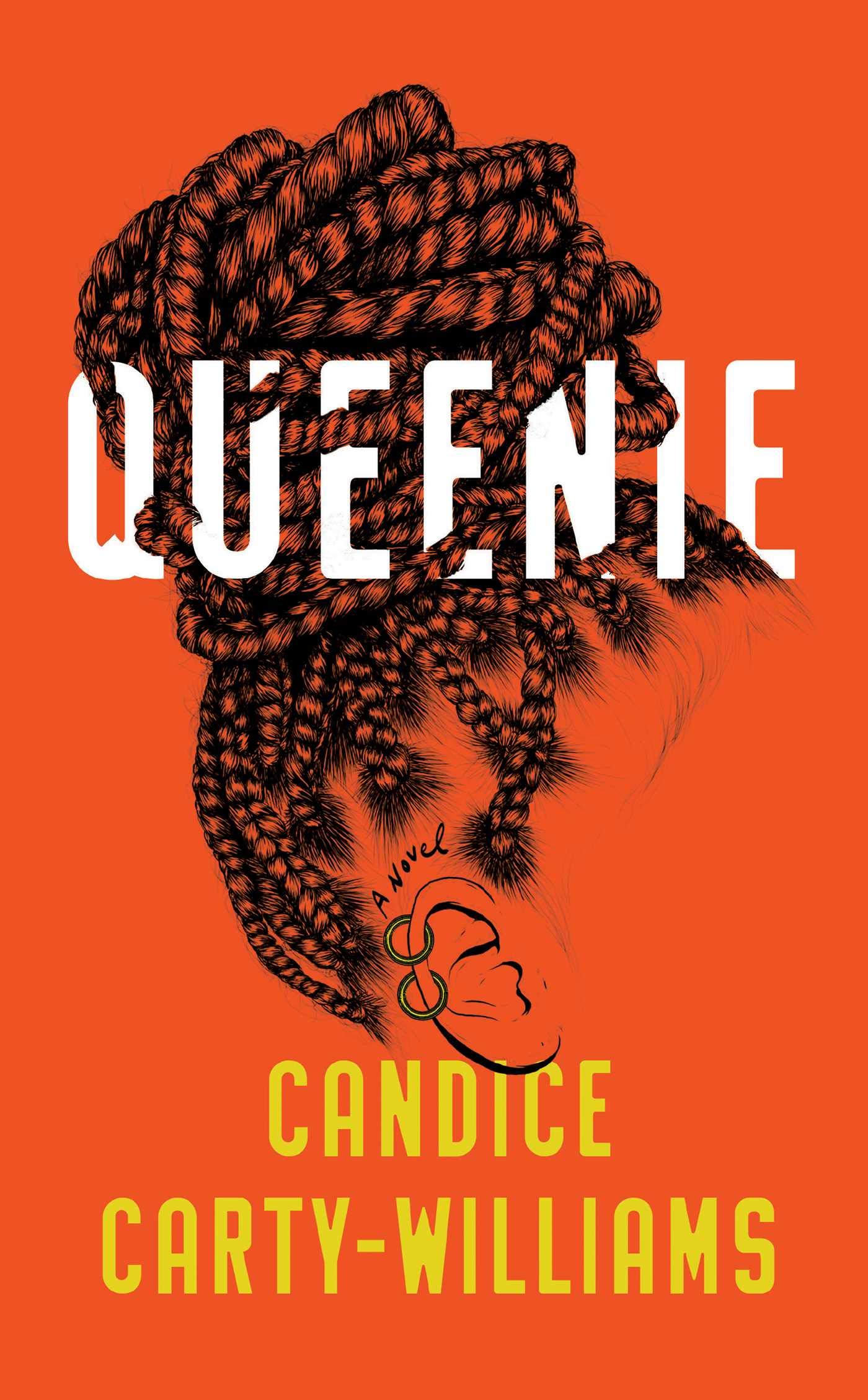
(I need to preface this post by saying Queenie should win some kind of award for its cover. I mean LOOK at that art! The nanosecond I laid eyes on that cover I knew I had to read this book, I didn’t even bother reading what in the world it was about.)
If you’re looking for a book about a young woman’s nosedive into self-destruction thanks to the end of an interracial relationship with a boyfriend who found no problem with his family’s overt racism, look no further! Candice Carty-Williams’ debut novel, Queenie, is exactly that.
Described as being a combination of Bridget Jones’s Diary and Americanah, the book begins with disheartening news from a trip to the gynecologist where Queenie (25-year-old, plus-sized British Jamaican woman) learns she has a miscarriage. Shortly after, her white boyfriend, Tom, breaks up with her and kicks her out of their flat (or as we Americans call them, apartment). These events set the scene for what is essentially Queenie spinning out of control until she has a breakdown and has to build herself up again. All this brought about by a breakup.
In an attempt to distract herself from her breakup, which she thinks is just a short break from the relationship, Queenie throws herself at men who only want to be with her because she’s black and has a big “arse.” And they don’t even want to be with her, so much as use her for sexual fantasies. The fetishization of black women and black women’s bodies is a huge theme in this novel, which is an important conversation to have. Cringeworthy as it was to read about Queenie entertaining men obsessed with her just because she’s black and full-bodied, it needed to be said. So often black women are pursued simply for the experience of their bodies, not because they’re actually found desirable and worthy of relationships. Ninety percent of this novel is literally just Queenie sleeping with white men who do whatever they want to her and she lets them. She never once seems to be enjoying herself; at one point the sex is so rough a clinic nurse thinks she’s been assaulted, and yet she refuses to speak up. Or at least have sex with someone who… actually likes her and values her as more than a sentient sex toy.
Another theme throughout the novel was low self-confidence and self-worth. As a thick black woman in a world that upholds whiteness and thinness, I can understand how Queenie feels. It is hard navigating through predominately white spaces as a black woman. Especially when you’re passionate about issues concerning race and gender and no one wants to take you seriously. However, what I can’t relate to is the way Queenie just accepts the way she’s treated by non-black people. Starting with that incident with Tom’s uncle (I’m going to keep referring to this because that’s how much it annoyed me) where he uses a slur in Queenie’s presence and isn’t in the slightest bit apologetic. Any time someone is racist or misogynistic or misogynoiristic towards Queenie, she just kind of… takes it. And it’s so frustrating to read. I shook my head in annoyance for the majority of this book. I just wanted Queenie to want better for herself and for so much of this novel she just doesn’t. The only time she ever really spoke up for herself was when she was telling people not to touch her hair, which, yeah, people need to respect boundaries, but Queenie took a lot more abuse from her surroundings than she needed to.
Of course I couldn’t help but wonder why Queenie seemed to only want to date white men when literally every white man she comes across treats her poorly. Carty-Williams tries to answer this question with a very skimmed-over explanation about why Queenie refuses to date black men that I couldn’t wrap my head around. Essentially, one guy freaked her out at a party a few years prior to the events in the novel and suddenly she’s over black men for good. That’s it, Queenie’s entire reasoning. But somehow racist white men who only look at her as a sex object are a better alternative. I guess that makes sense?
Queenie experienced abuse at the hands of a black man as a child, and her refusal to date within her race could have perfectly been pinned on that aspect of her past. That would have been much more realistic and made a lot more sense, but instead it’s just brushed off as one guy at a party years ago creeped her out *so bad* that she just disregards men of shared racial and ethnic background altogether. I just couldn’t understand it.
Truly and honestly, I just found Queenie to be exhausting. She was selfish, unwilling to take others’ feelings into consideration, and too self-absorbed to really take into account the world around her. Her lack of self-worth and almost refusal to stand up for herself made her unlikeable to me. Queenie spent way too much time focusing on mending a dead relationship with a boyfriend who didn’t care to do his part to defend her from racism. If you ask me, that’s an automatic dealbreaker. For the life of me, I wanted to scream some sense into her. I wanted to tell her to get the f*ck over useless Tom and his racist family, to focus on herself and her career, and wait until a man who treated her well and like a human being came along.
While I can’t say I liked much about Queenie or her story, I can say I did enjoy the nods to cultural, racial, and mental health issues Carty-Williams included in the novel. Queenie’s self-destructive antics raise conversations about racism, identity crises, depression, anxiety, dubious consent, sexual promiscuity, work place harassment, and how dismissive the black community can be about mental health professionals. A little clunky fitting all these topics into one book, but again, important subjects that need to be discussed.
Towards the end of the novel, Queenie does begin to get herself together. It’s a long, terrible road getting there, and while there isn’t the happiest ending to Queenie’s story, there is a note of optimism that despite all that she’s been through, once she stopped the destructive behavior and made steps toward healing herself from within, she will be okay. I think this is meant to be a bit of a note to Queenie‘s readers, specifically black women. This world will chew you up and spit you out, but you must take care of yourself. Put yourself first. It will be difficult, but in the end you will be okay.
Queenie wasn’t the book I believe Candice Carty-Williams wanted it to be for me as a black woman reader. And that’s okay. Just because I can’t relate to completely losing my head over a breakup doesn’t mean I got nothing from the book. If anything, Queenie reinforced my will to remain a steadfast, confident black woman. To maintain my self-worth and put myself first as I make my way through this mess we call life.


This book sounds super interesting, I might pick it up and read it soon. The way you’re describing Queenie, with her seemingly not wanting better for herself, reminds me of a character in a book I read for my women’s studies class last semester. It’s a book called The Women of Brewster Place, it’s by Gloria Naylor, and it’s considered to be a kind of feminist classic! Each section of the book is from the point of view of a different woman in the story. I highly recommend it if you feel like you got something out of this story!
LikeLiked by 1 person
Also, I just noticed you’re a UGA grad! That’s so cool, I’m heading into my 3rd year there this fall!
LikeLiked by 1 person
oh my gosh, that’s awesome! best of luck with your last few semesters in Athens and Go Dawgs! 🐶❤️🖤
LikeLike
Thanks for reading! I’m absolutely going to look into The Women of Brewster Place, thanks for the recommedation!
LikeLike
This book sounds really good and heartbreaking!
LikeLike
This books looks amazing. The cover too!! Loved the review
LikeLike
I have noticed several rave reviews for this one on my feed
LikeLike
I’ve seen lots of reviews for this book it seems to be very popular. Great review.
LikeLike
Seems to be a very interesting book.
Christina
LikeLike
That cover definitely is eyecatching and gorgeous. The artwork is fantastic. I’m sorry you struggled with the character of Queenie, but otherwise I’m glad you enjoyed this!
LikeLike